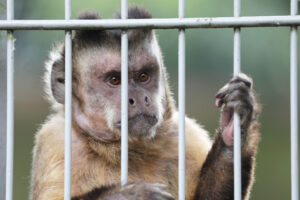Halloween Creatures Part 1: Embracing Our Shadow Side (Episode 5)
October 15, 2024Halloween Part 2: Bringing Light Out of the Shadows with Valerie Tovar (Episode 6)
October 22, 2024Embrace Your Shadow Side This Halloween!
Issue 6
Podcast Episode 5 is LIVE!
Creatures of the Night: Lessons from the Shadows!
Get Ready for a Spooky Halloween Journey into the Shadows!
We're venturing into the heart of darkness with Resilience Gone Wild episode 5: Creatures of the Night: Lessons from the Shadows! In this eerie special, we’ll explore the secret lives of creatures that thrive in the shadows—barn owls, black panthers, vampire bats, ghost orchids, spiders, and more! But this episode isn’t just about spooks and scares. We’ll also uncover the deep resilience lessons these mysterious beings hold and how embracing our own shadow side can lead to greater strength and self-awareness. Expect hauntingly beautiful stories, spine-tingling insights, and a few surprises along the way.
Tune in if you dare! Discover how the creatures of the night can inspire resilience and transformation in your own life—just in time for Halloween. Don’t miss out! Stay wild, stay resilient… and embrace the shadows.
And coming up next...
Shadows Part 2: Out of the Shadows - Ocean Conservation <br> (Episode 6: Tuesday, 10/22)
Val Tovar, Conservation Manager at Loggerhead Marinelife Center will dive deep, bringing ocean conservation out of the shadows and into the light—revealing why it’s crucial for the health of our planet, why it matters, and how you can help. Don't miss it!
And... Watch for these wild episodes dropping in November...
Get Into Flow with laughing gulls and guest best-selling author Sy Montgomery (Soul of an Octopus and many more!)
Thrive in Connection with the three sisters and guest regenerative systems guru Ryan James in these special Thanksgiving episodes.
Energizing Thoughts for Win-Win-Win Momentum
(Just some thought-provoking stuff I'm thinking about these days)
Have You Heard of Rewilding?
Rewilding is an exciting and important conservation effort focused on restoring natural ecosystems to their wild, self-sustaining state. The idea is simple but powerful—by reintroducing native species, rebuilding habitats, and letting nature take its course, we can bring back biodiversity and restore balance to our environment, locally and globally.
Why does it matter? Human activity—urbanization, deforestation, and industrial agriculture—has disrupted ecosystems around the globe. These changes have led to the loss of vital species and the breakdown of natural processes, threatening both wildlife and humans. Rewilding is about letting nature heal, bringing back the animals, plants, and ecosystems that keep the planet resilient and thriving.
What’s being done? Across the world, rewilding projects are making a real impact. One successful U.S. example is the reintroduction of wolves to Yellowstone National Park in 1995. Wolves, a keystone species, had been wiped out from the area for decades, leading to an overpopulation of elk that damaged the park’s vegetation and riverbanks. Once wolves were brought back, the ecosystem began to heal—elk populations were naturally controlled, vegetation rebounded, and species like beavers and birds returned to the park, restoring the balance of the entire ecosystem.
But it’s not always simple. Rewilding often requires humans to give up something—whether it's land for agriculture, urban development, or even the presence of certain species. The return of wolves to Yellowstone, for example, led to concerns among local ranchers, as wolves occasionally prey on livestock. These challenges highlight the delicate balance between human needs and conservation goals, requiring thoughtful planning, compromise, and collaboration to ensure a win-win-win for people, wildlife, and the planet. I’ll be discussing these challenges in upcoming podcast episodes about elephants and giant tortoises, focusing on how we can navigate the complex interface between human development and nature's needs.
How can we help? Even if you’re not directly involved in rewilding projects, there are simple actions you can take to support these efforts:
- Support rewilding organizations by donating or volunteering. Check out Planet Wild, Wildya, Thompkins Conservation, WCS and others working on this purpose-driven journey. Shout out to Oliver Dauert of Wildya who is scheduled to be a Resilience Gone Wild podcast guest in early 2025!
- Advocate for policy changes that protect wildlife and support ecosystem restoration.
- Create wild spaces in your own backyard by planting native species and avoiding the use of pesticides.
- Educate others on the importance of biodiversity and natural ecosystems.
Rewilding is not just about returning to the past—it’s about building a more resilient and sustainable future for both nature and humanity. By helping to restore ecosystems, we can all contribute to a healthier, more balanced planet.
Check out: TED Talks by Kristine McDivitt Tomkins - former Patagonia CEO: Let's Make The World Wild Again A Bold Plan To Rewild
Smiles from the Wild Side!
ID 124517520 @ Edwin Butter | Dreamstime.com
Snack Attack: A Call for Fairness!
It can be exasperating when life throws a little unfairness your way!
Nature's Team Resilience WOW of the Week!
ID 44724547 @ Kgkarolina | Dreamstime.com
Vampire Bats
The power of giving in the dark
This week's special Halloween episode of Resilience Gone Wild highlights vampire bats. They don't just thrive in the shadows, they offer a fascinating glimpse into the power of teamwork and survival. These nocturnal mammals may have a fearsome reputation, but they also show us how cooperation and social bonds can make the difference between life and death.
Vampire bats practice reciprocal altruism—a behavior that involves sharing food with others in their group. After a successful night of feeding on blood, a well-fed bat will often share some of its meal with a less fortunate companion by regurgitating blood. This isn't just about generosity—it's a survival strategy. Bats that share today can expect help in return when they need it most, increasing the odds of survival for the entire group.
What’s fascinating is that, while vampire bats aren’t what we’d consider a traditional "team," they exhibit team-like behavior when it matters most. Cooperation strengthens the bats’ social bonds, creating psychological safety—the feeling that they can rely on each other in challenging situations. This trust is essential to their long-term resilience. Bats that help each other build a safety net, knowing they have support when needed. This network of mutual care and trust is key to their survival in tough environments.
And it doesn't stop there. These bats reinforce their social bonds through grooming, which strengthens trust and ensures that the food-sharing system keeps flowing. It's like a dark, nocturnal version of teamwork, where survival is a shared responsibility.
The Resilience Lesson
Vampire bats teach us that true resilience comes from creating a sense of safety within your team. When cooperation and trust are at the core of your relationships, you build a reliable support network. This psychological safety empowers team members to help one another without fear of judgment, increasing the collective strength of the group. Like vampire bats, we don’t have to navigate tough situations alone—resilience grows when we share the load, support each other, and create space for everyone to contribute.
Next time you find yourself in a challenging situation, think like a vampire bat. Share resources, ideas, and support freely. Trust that by building these connections, you create a win-win-win for yourself, your team, and the greater community.
Survival Status
Vampire bats are not currently endangered, but their habitat and populations are affected by habitat destruction and human fears about disease transmission, leading to culling in some areas. But, they play an important ecological role in controlling other species' populations and fostering biodiversity. As with many species, maintaining their ecosystems and understanding their behavior are crucial for a balanced environment.
Reach Out!
Love hearing from you! Keep those emails coming! Love your comments, powerful stories of how nature's resilience has inspired you and others, ideas for upcoming podcasts and newsletters,... whatever is on your mind.
Let's start a conversation!
And, let's chat about how we can work together to get you, your team and/or your organization to WinWinWin and into a WinWinWin mindset!
Email me at Jessica@WinWinWinMindset.com
Check out my website WinWinWinMindset.com





